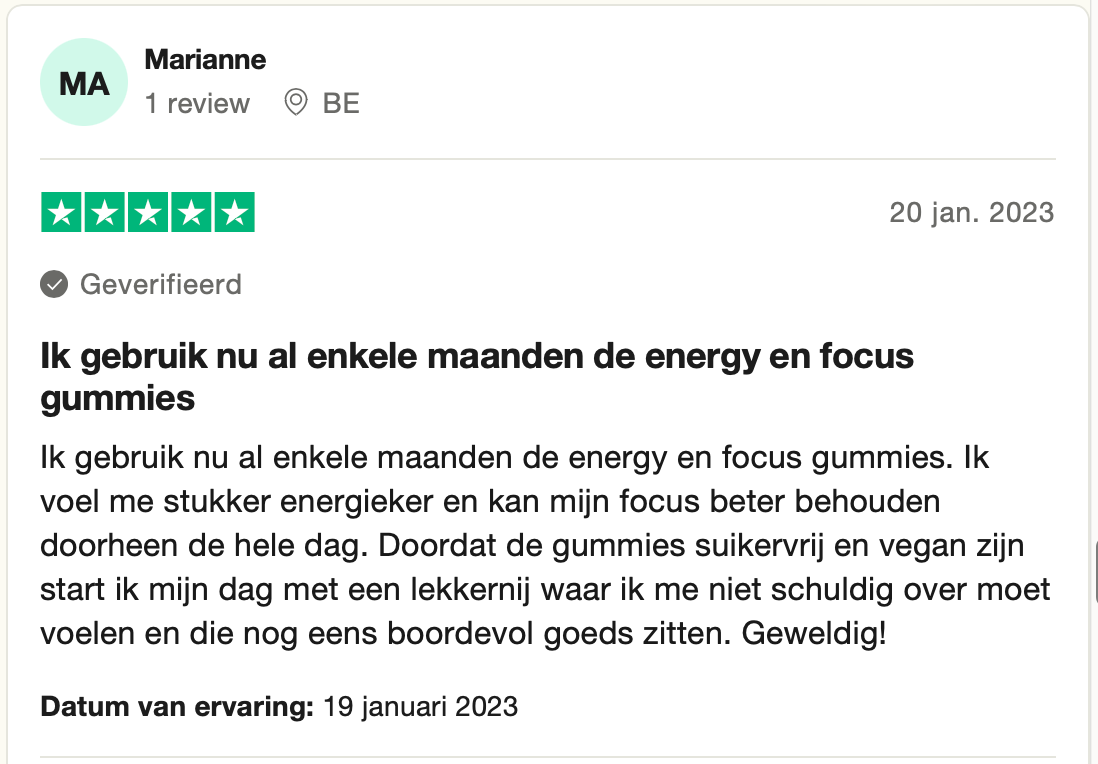Low energy during pregnancy?
door Floris Biesemans op Feb 21, 2023
Pregnancy is a special time in a woman's life, but it can also be a challenging time when your body goes through many changes. Many women experience fatigue and lack of energy during pregnancy, which can have a major impact on daily functioning and enjoying this special time.
There are several causes of fatigue during pregnancy, including the hormonal changes in the body, the growing uterus putting pressure on organs, and the body's increased energy consumption to support the growing fetus. You may also not be getting enough rest and sleep because of nighttime toilet visits and uncomfortable positions while sleeping, for example.
Although fatigue during pregnancy is quite normal, it can still be an annoying and hindering complaint. In this blog, therefore, we will take a closer look at the causes of fatigue during pregnancy and give tips and advice on how to get more energy and enjoy this special period to the fullest.
There are several causes of fatigue and lack of energy during pregnancy. One of the main causes is the change in hormone levels in a pregnant woman's body. According to a study published in the journal "Obstetrics and Gynecology" in 2009, the increased production of progesterone and estrogen during pregnancy can lead to overtiredness and lack of energy.
Another cause of fatigue and lack of energy during pregnancy is the increase in body weight. As the fetus grows, the mother's body must make extra effort to carry and support the extra weight. This can lead to overtiredness and a feeling of exhaustion.
In addition, lack of sleep or rest can also lead to overtiredness and lack of energy during pregnancy. Many pregnant women have trouble sleeping because of physical discomfort or anxiety and tension about the upcoming delivery. This can lead to lack of sleep and feeling tired during the day. According to a study published in the journal "Sleep Medicine Reviews" in 2015, lack of sleep during pregnancy can lead to decreased energy and cognitive function.
Finally, lack of certain nutrients, such as iron or vitamin B12, can also lead to fatigue and lack of energy during pregnancy. Therefore, it is important for pregnant women to get enough nutrients.
There are several causes of fatigue during pregnancy, including the hormonal changes in the body, the growing uterus putting pressure on organs, and the body's increased energy consumption to support the growing fetus. You may also not be getting enough rest and sleep because of nighttime toilet visits and uncomfortable positions while sleeping, for example.
Although fatigue during pregnancy is quite normal, it can still be an annoying and hindering complaint. In this blog, therefore, we will take a closer look at the causes of fatigue during pregnancy and give tips and advice on how to get more energy and enjoy this special period to the fullest.
Causes of fatigue during pregnancy
There are several causes of fatigue and lack of energy during pregnancy. One of the main causes is the change in hormone levels in a pregnant woman's body. According to a study published in the journal "Obstetrics and Gynecology" in 2009, the increased production of progesterone and estrogen during pregnancy can lead to overtiredness and lack of energy.
Another cause of fatigue and lack of energy during pregnancy is the increase in body weight. As the fetus grows, the mother's body must make extra effort to carry and support the extra weight. This can lead to overtiredness and a feeling of exhaustion.
In addition, lack of sleep or rest can also lead to overtiredness and lack of energy during pregnancy. Many pregnant women have trouble sleeping because of physical discomfort or anxiety and tension about the upcoming delivery. This can lead to lack of sleep and feeling tired during the day. According to a study published in the journal "Sleep Medicine Reviews" in 2015, lack of sleep during pregnancy can lead to decreased energy and cognitive function.
Finally, lack of certain nutrients, such as iron or vitamin B12, can also lead to fatigue and lack of energy during pregnancy. Therefore, it is important for pregnant women to get enough nutrients.
Tips for more energy during pregnancy
- Drink enough water: Drinking enough water can help keep the body hydrated and increase energy levels. Drink at least 8-10 glasses of water a day to ensure you stay hydrated.
- Avoid stress: Stress can lead to fatigue and lack of energy. Find ways to reduce stress, such as meditation, deep breathing exercises or mindfulness. Also talk to your partner, family or friends to help you reduce stress.
- Get enough rest: Get enough rest and sleep to give the body a chance to recover and recharge. Take advantage of daytime naps, avoid excessive activity and prioritize to ensure you get enough rest.
- Do light exercise: Light exercise such as yoga, walking or swimming can help improve blood circulation and increase energy levels. It can also help relax muscles and reduce stress.
- Talk to a professional: Discuss any problems with fatigue and lack of energy with a health professional. They can offer advice on how to improve your energy levels during pregnancy and identify any underlying health problems.

Onze tevreden klanten


























